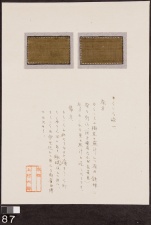Difference between revisions of "Mokukoku (Ternstroemia gymnanthera) - right (87 R)"
Jump to navigation
Jump to search
(username removed) |
(username removed) |
||
| Line 1: | Line 1: | ||
| − | {| class="wikitable" | + | [[[SliderGallery rightalign|Uemura_04-23-2009_087.jpg~Normal]]]{| class="wikitable" |
|- | |- | ||
! scope="row"|Museum number | ! scope="row"|Museum number | ||
Revision as of 09:32, 8 June 2013
| Museum number | 87 |
|---|---|
| Uemera number / title | 一; 櫨染 廿五 "Haze-some 25" |
| Folder location | 1st shelf |
| Sample location | right (87 R) |
| Fiber type | silk |
| Color | dark brown |
| Dyestuff (Japanese common name) | もくこく : Mokukoku |
| Dye (English common name) | Evergreen Tree |
| Dyestuff (botanical name) | Ternstroemia gymnanthera (Wight et Arn.) Bedd. |
| Plant part | bark /dried (?) |
| Dyestuff extraction | boiled in water |
| Auxiliary agent in dye bath | - |
| Mordant | iron |
| Other auxiliary agent | - |
| Uemera's notes | There is another plant, called Hamamokukoku (濱もくこく) or Sharinbai (しゃりんばい), which is similar to Mokukoku, used in the Ryuku islands, Japan. Mokukoku is used around the Izu region in Japan. This sample was soaked into: 1) dye bath; 2) iron mordant bath; and 3) ash water bath. Mordanting with ash water would make the color more red. |
| Uemera's date | Kyoto |
